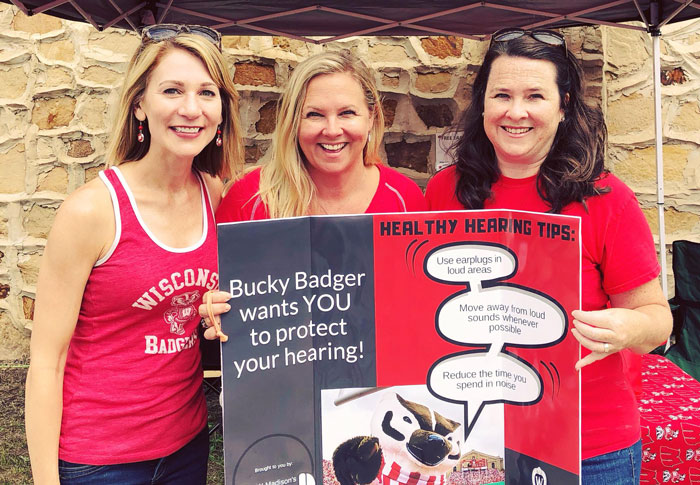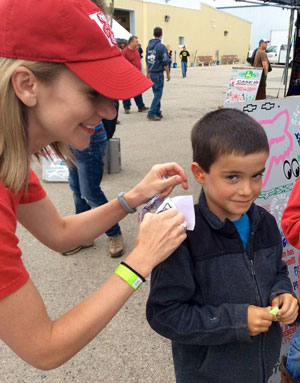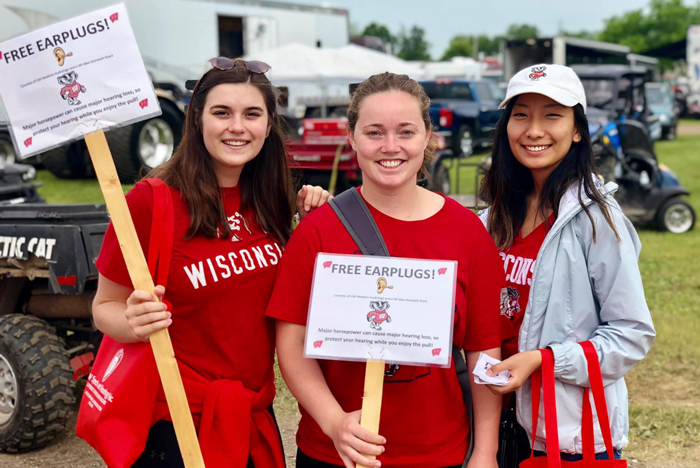Tomah Hearing Loss Prevention Outreach
- Need: Farmers are highly susceptible to permanent hearing loss due to prolonged exposure to loud machinery and livestock.
- Intervention: Faculty and students from the audiology department at the University of Wisconsin-Madison supplied earplugs, free hearing testing, and hearing loss prevention education to attendees and participants at an annual tractor pull event.
- Results: Between 2014 and 2019, the audiology team distributed more than 16,000 pairs of earplugs; attendees were receptive to the hearing loss prevention education provided by the team.
Evidence-level
Promising (About evidence-level criteria)Description
Faculty and graduate students from the University of Wisconsin-Madison Department of Communication Sciences and Disorders developed an initiative to reach out to rural farmers and tractor pull fans on the issue of permanent hearing loss. An audiology team attended the Tomah Tractor Pull annually from 2014 to 2019, in order to hand out hearing protection and educate the attendees and participants, particularly farmers, on the risks of prolonged, unprotected exposure to high-decibel noises coming from tractors, other loud machinery, and even livestock.

This outreach was supported by a mini-grant from the Baldwin Wisconsin Idea Endowment, several Wisconsin Idea grants, and the UW Speech and Hearing Clinic.
Services offered
A team of two audiology clinical professors (audiologists) and audiology graduate students talked with tractor pull attendees, participants, and workers about healthy hearing habits and distributed hearing protection at this very loud event.
The grant money allowed the team to purchase an audiometer and calibrated sound level meter, which enabled them to measure the sound levels of the trucks and tractors throughout the event. This helped raise awareness of hearing loss by showing this visual display of high-decibel activity to the attendees and educating people on what decibel levels call for ear protection.
Results

This program accomplished two goals:
- Gave an immediate means of hearing protection (earplugs) to people at risk for hearing loss
- Educated attendees on ways to prevent permanent, noise-induced hearing loss
Program staff also informed the tractor pull attendees on the cumulative nature of hearing and the precautions one should take to protect hearing, even at an older age, to prevent further damage.
For more information on the audiology team's successful efforts:
Buhr-Lawler, M. (2017). A Hearing Loss Prevention Outreach Program for Farmers and Motorsports Enthusiasts. Seminars in Hearing, 38(2), 212-222.
Challenges
There is an ingrained cultural attitude among tractor pull attendees that discourages the use of hearing protection in this environment. Additionally, many of the attendees experience high levels of noise exposure in their work and other recreational activities. Most farmers are not required to participate in a mandatory hearing loss prevention program, so there are many at the tractor pull who have not considered using hearing protection as an important safety factor.

Replication
Program coordinators recommend securing grant funding or financial support and a supportive employer. It's also important to establish a community partnership with the event organizers, since their support is invaluable in guaranteeing program success, and to have energetic and willing volunteers.

Contact Information
Melanie Buhr-Lawler, Au.D., CCC-A, Clinical Professor of AudiologyUniversity of Wisconsin-Madison
UW Speech and Hearing Clinic
608.890.1504
melanie.buhr@wisc.edu
Topics
Agricultural health and safety
· Farmers and farmworkers
· Health screening
· Hearing impairment
· Wellness, health promotion, and disease prevention
States served
Wisconsin
Date added
November 23, 2015
Suggested citation: Rural Health Information Hub, 2024 . Tomah Hearing Loss Prevention Outreach [online]. Rural Health Information Hub. Available at: https://www.ruralhealthinfo.org/project-examples/865 [Accessed 4 November 2025]
Please contact the models and innovations contact directly for the most complete and current information about this program. Summaries of models and innovations are provided by RHIhub for your convenience. The programs described are not endorsed by RHIhub or by the Federal Office of Rural Health Policy. Each rural community should consider whether a particular project or approach is a good match for their community’s needs and capacity. While it is sometimes possible to adapt program components to match your resources, keep in mind that changes to the program design may impact results.
